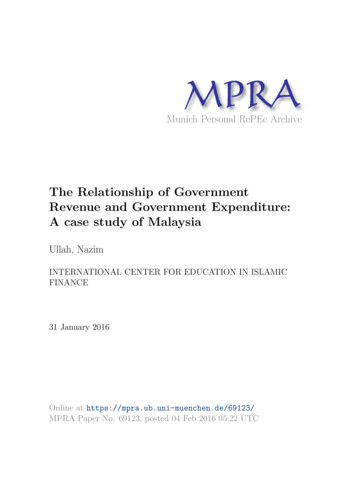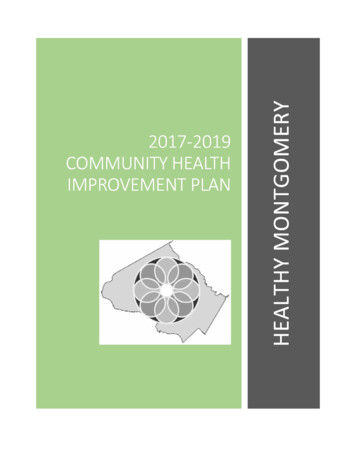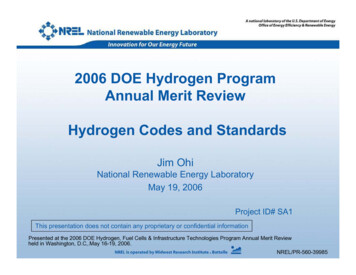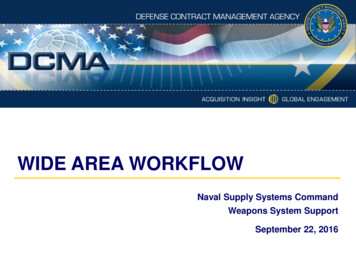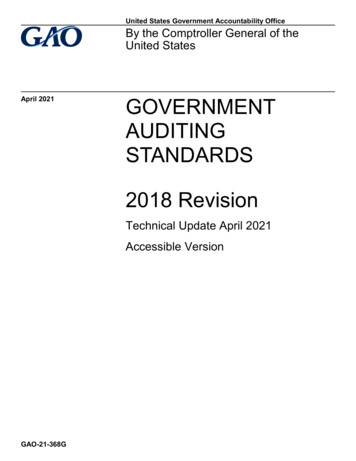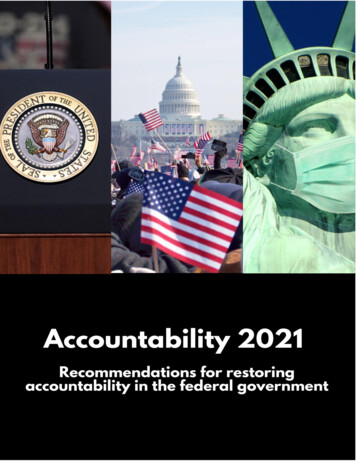
Transcription
AcknowledgementsOpen The Government acknowledges and appreciates many organizations and individualscontributing comments and feedback on drafts of this document. The project benefited from anactive steering committee, which established topics on which working groups identified currentproblems and developed actionable recommendations. We appreciate the time and effort,especially, put forth by the leads and co-leads of each working group, to pull together these setsof recommendations. While each organization contributed to the end product, Open TheGovernment bears sole responsibility for the end product.Steering CommitteeAlex Abdo, Knight First Amendment Institute atColumbia UniversitySteve Aftergood, Federation of AmericanScientistsRyan Alexander, Hyphen Strategies, LLCGary Bass, Bauman Foundation*Tom Blanton, National Security ArchiveDanielle Brian, Project On GovernmentOversightSteve Ellis, Taxpayers for Common SenseAustin Evers, American OversightCaroline Fredrickson, Georgetown Law andBrennan CenterHeather Higginbottom, Former Deputy Secretaryof State*Karen Hobert Flynn, Common CauseSally Katzen, Former Government Official andProfessor, New York University School ofLaw*Kevin Kosar, American Enterprise InstituteConrad Martin, Fund for ConstitutionalGovernmentAndy Rosenberg, Union of Concerned ScientistsLisa Rosenberg, Open The Government*Tom Saenz, MALDEFHina Shamsi, American Civil Liberties UnionThomas Susman, Strategic Advisor, AmericanBar Association*Anne Tindall, Protect DemocracyAnne Weismann, FOIA LitigatorRobert Weissman, Public Citizen*John Wonderlich, Sunlight Foundation* Members of the executive committeeAd Hoc AdvisorsVanita Gupta, Leadership Conference on Civil and Human RightsMark De La Iglesia, Open Society FoundationsSarah Knight, Open Society FoundationsEditorial ConsultantSixteenth Street Consulting LLC (Rick Blum)Accountability 20211
Working GroupsOpen GovernmentCo-LeadsOpen The Government (Emily Manna)FOIA Litigator (Anne Weismann)Participating OrganizationsKnight First Amendment Institute atColumbia University (Alex Abdo)Federation of American Scientists (SteveAftergood)Bauman Foundation (Gary Bass)National Security Archive (Tom Blanton)Project On Government Oversight (DanielleBrian)Taxpayers for Common Sense (Steve Ellis)American Oversight (Austin Evers)Public Citizen (Susan Harley)Demand Progress (Alex Howard)American Enterprise Institute (Kevin Kosar)Reporters Committee for Freedom of thePress (Adam Marshall and MelissaWasser)National Security Counselors (KelMcClanahan)Government Accountability Project (IrvinMcCullough)MuckRock (Michael Morisy)Union of Concerned Scientists (AndrewRosenberg and Michael Halpern)American Civil Liberties Union (Hina Shamsiand Kate Oh)Human Rights First (Rita Siemion)American Bar Association (Tom Susman)Balance of PowerCo-LeadsTaxpayers for Common Sense (Steve Ellis)Protect Democracy (Anne Tindall)Participating OrganizationsFederation of American Scientists (SteveAftergood)EthicsCo-LeadsAmerican Oversight (Austin Evers)Common Cause (Beth Rotman)Participating OrganizationsCitizens for Responsibility and Ethics inWashington (Jennifer Ahearn)Hyphen Strategies, LLC (Ryan Alexander)Center for American Progress (Sam Berger)Common Cause (Karen Hobert Flynn)Georgetown Law and Brennan Center(Caroline Fredrickson)Campaign Legal Center (Kedric Payne andDelaney Marsco)Protect Democracy (Anne Tindall)Public Citizen (Robert Weissman)WhistleblowersCo-LeadsGovernment Accountability Project (IrvinMcCullough)Union of Concerned Scientists (AndrewRosenberg)Participating OrganizationsKnight First Amendment Institute at ColumbiaUniversity (Alex Abdo)Hyphen Strategies, LLC (Ryan Alexander)Project On Government Oversight (DanielleBrian)Common Cause (Karen Hobert Flynn)Defending Rights and Dissent (Chip Gibbons)Union of Concerned Scientists (MichaelHalpern)National Security Counselors (KelMcClanahan)Reporters Committee for Freedom of thePress (Melissa Wasser)Responsive GovernmentAccountability 20212
Center for American Progress (Sam Berger)Taxpayers for Common Sense (Steve Ellis)American Oversight (Austin Evers)Common Cause (Karen Hobert Flynn)Project On Government Oversight (DanielleBrian and Elizabeth Hempowicz)American Enterprise Institute (Kevin Kosar)Open The Government (Lisa Rosenberg andEmily Manna)National Security Counselors (KelMcClanahan)Government Accountability Project (IrvinMcCullough)Good Government Now (Bill Murphy)American Civil Liberties Union (Hina Shamsiand Kate Oh)Human Rights First (Rita Siemion)Protect Democracy (Anne Tindall)FOIA Litigator (Anne Weismann)Public Citizen (Robert Weissman and LisaGilbert)LeadPublic Citizen (Robert Weissman*)Participating OrganizationsFederation of American Scientists (SteveAftergood)Bauman Foundation (Gary Bass)Center for American Progress (Sam Berger)American Oversight (Austin Evers)Campaign Legal Center (Brendan Fischer)Georgetown Law andBrennan Center (Caroline Fredrickson)Union of Concerned Scientists (MichaelHalpern)FOIA Litigator (Anne Weismann)Public Citizen (Robert Weissman)Protect Democracy (Anne Tindall)Pandemic Preparedness and ResponseCo-LeadsOpen The Government (Hannah Bassett)Milken Institute School of Public Health,George Washington University (LizBorkowski)Participating OrganizationsEquity Forward (Molly Bangs)Bauman Foundation (Gary Bass)Center on Budget and Policy Priorities(Jared Bernstein)American Oversight (Austin Evers)National Security Archive (Tom Blanton,Lauren Harper)National Security Counselors (KelMcClanahan)Government Accountability Project (IrvinMcCullough)Project On Government Oversight (SeanMoulton)Public Citizen (Zain Rizvi, Susan Harley,Bartlett Naylor)Economic Policy Institute (Heidi Shierholz)Reporters Committee for Freedom of thePress (Melissa Wasser)Accountability 20213
Accountability 20214
Table of ContentsAcknowledgements .1Introduction: About the Accountability 2021 Project .9Executive Summary .10Chapter 1: Open Government .18Chapter Overview .18Principle 1: The public has a right to complete, accurate, and timely information necessaryto hold officials accountable and to participate fully in government. .19The Problem .19Recommendations for Action on Day One .19Recommendations for Short-term Action (First 100 Days) .20Recommendations for Long-term Action.23Recommendations for Legislative Action .25Principle 2: Secrecy undermines democracy and paves the way for rights violations andabuses. .27The Problem .27Recommendations for Action on Day One .27Recommendations for Short-term Action (First 100 Days) .28Recommendations for Long-term Action.31Recommendations for Legislative Action .33Appendix to Chapter 1: Open Government .33Chapter 2: Ethics.41Chapter Overview .41Principle 3: The administration must elevate ethics as a core value by prioritizing meaningfulstructural ethics reforms and committing publicly to adhere to the rules and the values andnorms behind them.42The Problem .42Recommendations for Action on Day One .42Recommendations for Short-term Action (First 100 Days) .44Recommendations for Legislative Action .44Principle 4: The people in government should work for the public, not for personal or privateinterests. .45The Problem .45Accountability 20215
Recommendations for Action on Day One .46Recommendations for Short-term Actions (First 100 Days) .47Recommendations for Long-term Action.47Recommendations for Legislative Action .47Principle 5: To judge whether the government is acting ethically and to hold unethical actorsaccountable, the government must preserve meaningful ethics records and make timelyethics disclosures. .48The Problem .48Recommendations for Action on Day One .49Principle 6: The public has a right to: meaningful disclosure concerning all individuals andorganizations lobbying their elected officials; a government free from wealthy specialinterests placing their own loyal personnel into government posts; and a government freefrom former government officials exploiting their networks within government for personalgain. .50The Problem .50Recommendations for Action on Day One .50Recommendations for Short-term Action (First 100 Days) .53Recommendations for Long-term Action.53Recommendations for Legislative Action .54Appendix to Chapter 2: Ethics .55Chapter 3: Balance of Power .56Chapter Overview .56Principle 7: The executive branch must respect the limits of the presidency and recognizethat it must act as one of three co-equal branches of government. .56The Problem .56Recommendations for Action on Day One .56Principle 8: No one is above the law. Our justice system must serve the vulnerable andmarginalized in our society rather than merely the politically powerful. .60The Problem .60Recommendations for Short-term Action (First 100 Days) .61Recommendations for Legislative Action .62Appendix to Chapter 3: Balance of Power .64Chapter 4: Whistleblowers .65Chapter Overview .65Accountability 20216
Principle 9: Whistleblowers play a critical role in constitutional checks and balances andexposing executive branch abuses; therefore, they must have meaningful channels to makedisclosures and solid protections from retaliation. .65The Problem .65Recommendations for Action on Day One .66Recommendations for Short-term Action (First 100 Days) .66Recommendations for Legislative Action .69Chapter 5: Responsive Government.70Chapter Overview .70Principle 10: Existing deregulatory maneuvers, which have undermined public health, safety,environment, equity, civil rights, fairness, justice and democracy should be repealed. .70Recommendations for Action on Day One .70Principle 11: The regulatory process should be rebalanced to advance health, safety,justice, democracy and equity values and priorities and to ensure appropriate considerationis given to non-monetary benefits. .72Recommendations for Action on Day One .72Recommendations for Short-term Action (First 100 Days) .73Recommendations for Legislative Action .74Principle 12: Centralized review of regulatory action should be revamped to promote timelyrulemaking to strengthen public protections.74Recommendations for Short-term Action (First 100 Days) .75Principle 13: Citizens should be empowered to participate to make regulations work, andundue influence of regulated entities in rulemakings should be ended. .76Recommendations for Short-term Action (First 100 Days) .76Recommendations for Legislative Action .77Principle 14: When rules are challenged, agency expertise should be given deference .77Recommendations for Legislative Action .77Principle 15: Regulatory enforcement and accountability for regulatory violations should bestrengthened. .78Recommendations for Short-term Action (First 100 Days) .78Recommendations for Legislative Action .78Chapter 6: Pandemic Preparedness and Response .80Chapter Overview .80Principle 16: In order to protect the health and wellbeing of the public during and after thecoronavirus pandemic, government decisions must be transparent and informed by science,Accountability 20217
and expert opinion must be shared with the public and not be constrained by politicalinterference, fear of retribution or suppression. .80The Problem .80Recommendations for Action on Day One .81Recommendations for Short-term Action (First 100 Days) .82Recommendations for Long-term Action.84Recommendations for Legislative Action .84Principle 17: The consequences of the pandemic should not be disproportionately worse forthe economically vulnerable, communities of color, and other under-representedcommunities. .85The Problem .85Recommendations for Short-term Action (First 100 Days) .85Recommendations for Long-term Action.86Principle 18: Access to Information, including around government supplies, research,spending, and health data related to COVID-19 will result in better preparedness for futurepandemic or other crises that impact the health of the population. .86The Problem .86Recommendations for Action on Day One .87Recommendations for Short-term Action (First 100 Days) .88Recommendations for Long-term Action.90Recommendations for Legislative Action .90Appendix to Chapter 6: Pandemic Preparedness and Response .92Accountability 20218
Introduction: About the Accountability 2021 ProjectAccountability 2021 is an agenda to repair critical gaps in transparency, ethics and oversightand to begin to forge a new path toward a long-lasting accountable government.By “accountable government” we mean transparency and participatory approaches to ensurethat government and its employees follow the laws and normative requirements of ourdemocracy. An accountable government also allows the public to assess the performance of ourelected leaders.Access to information and meaningful oversight and accountability are foundational to ourdemocratic forms of government. It is imperative that on January 20, 2021, the presidentprioritizes accountability in governance, establishing accountability practices throughout theexecutive branch early on, implementing and enforcing them throughout the next four years. Toensure accountability persists in government policy and practices beyond the next presidentialterm, the president should actively support enacting new laws to strengthen accountabilityprotections.Convened by Open The Government, Accountability 2021 brings together into a collective voicenumerous experienced individuals and experts from organizations working on accountabilityissues to develop solutions to longstanding gaps and failures in existing transparency, ethics,and oversight laws and practices. The product of these efforts in the pages that follow arerecommendations to rectify the glaring failures of the current “norms” of governance.This document is not intended to support or oppose a candidate for office or any question on aballot, but rather to chart a course consistent with the missions of the organizations participatingin this effort and common concern about these issues.About Open The GovernmentOpen The Government is an inclusive, nonpartisan coalition that works to strengthen ourdemocracy and empower the public by advancing policies that create a more open,accountable, and responsive government.Accountability 20219
Executive SummaryIn January of 2020, nearly two dozen organizations came together to begin work on setting anagenda for a more accountable government. What united them was not a partisan politicalagenda but the belief that (1) our democratic institutions must be more accountable to the publicthey serve; (2) and the time is ripe, no matter who holds the office of the presidency in 2021, toset in motion an agenda that advances accountability. Over the months that followed, dozensmore organizations joined the effort. The fruits of their efforts are concrete proposals that thepresident can begin to put in place to advance accountability on January 20, 2021.But what is an accountable government? For those who contributed to the Accountability 2021effort, it is a government that is both responsive to and representative of the public. It means thepeople have access to all government information necessary to hold the governmentaccountable—not just the information those in power wish to disclose for political purposes. Itmeans that the rule of law applies to public servants and that there will be consequences forthose who violate the rules. It means that decision-making will consider all perspectives, not justthose of the powerful or well-connected, and that the public has a voice in the process. And itmeans that when the government acts, outcomes are not dictated by whether one lives in a redstate or a blue state, or one’s economic status, race, ethnicity, religion or gender; rather it isacting in the best interest of the country and its people.The Accountability 2021 effort recognizes that the president has the power to create a moreaccountable government and demands that whoever sits in the Oval Office take steps to do so.By encouraging agencies to use compliance mechanisms, hiring qualified personnel andrequesting budgets sufficient to ensure agencies can fulfill their mandates, the president canrebuild an ecosystem where regulations actually have the ability to protect the public interest.No single effort can remedy all of the ways our democratic institutions fail the people they aresupposed to serve. However, if the president takes steps outlined here (and urges Congress tocodify many of these recommendations), he can progress towards creating a government of, by,and for the people.The Accountability 2021 recommendations are guided by eighteen core principles that fall intobroad categories that reflect much of what is necessary to create a responsive government:Open Government, Ethics, Balance of Power, Whistleblowers, Responsive Government.Recognizing that the president will face the continuing fallout of the COVID-19 outbreak, theAccountability 2021 contributors added Pandemic Preparedness and Response as a sixthcategory in need of accountability reform.Open Government is at the foundation of an accountable government. We have a right to knowwhat our government is doing, because only by being informed can the public judge whether ourelected officials are keeping their promises, whether they are spending taxpayer dollarsresponsibly and in a way that reflects our values and priorities, and whether our institutions andthe people that serve in them are doing their jobs competently, appropriately, and fairly.Crucially, if we do not collect and make public information about our government, we will neverbe able to understand what is working nor be able to fix what is not. Yet the systems establishedAccountability 2021 10
to bring transparency to government have proven to have serious, if not fatal, flaws. Agencyleadership fails to reward civil servants who work to advance transparency, instead too oftenconsistently violate legal requirements to provide comprehensive, accurate, and timelyinformation to the public; the default to extreme, unwarranted secrecy often puts civil rights andcivil liberties at risk; and antiquated technology and the lack of uniform data protocols leave usin the dark.Principle 1: The public has a right to complete, accurate, and timely informationnecessary to hold officials accountable and to participate fully in government.The president must commit to bringing the greatest level of transparency to all aspects of thegovernment, and direct all federal employees to embrace transparency as a core value. OnJanuary 20th, he must issue a presidential memorandum on transparency that instructs allfederal employees—and in particular agency leadership—to embrace transparency, withparticular focus on the Freedom of Information Act. He must also appoint a Chief AccountabilityOfficer—a senior administration official housed in the White House, whose mandate includessetting administration policy on transparency and ethics and who will have access to thepresident as well as leadership across federal agencies. The president must resume the releaseof White House visitor logs, as well as initiate the visitor logs of all executive branch agencies.Principle 2: Secrecy undermines democracy and paves the way for rights violations andabuses.The flip side of transparency is secrecy, which paves the way for waste, malfeasance, andabuse while harming civil rights and civil liberties. Institutionalized secrecy has long been rootedin the Justice Department's Office of Legal Counsel, which is responsible for a growing body ofsecret law that has been the basis for many unaccountable and, in some cases, unlawfulexercises of executive authority. Secret law is, on its face, antithetical to democracy. Thepresident must end the practice of secret law by directing the Office of Legal Counsel to releasefinal legal opinions to the public, and put measures in place to address secret law going forward.For too long, secrecy has been used to cover up wrongs committed by the government tounderserved communities. In order to fully understand the degree to which communities ofcolor, immigrants and others experience disparate treatment from law enforcement authorities,data collection around police use of force and deaths in custody must improve, law enforcementagencies should be penalized when they fail to comply with reporting requirements, andimmigration authorities must respect openness and submit to oversight. The president mustimprove spending transparency, a powerful tool that not only prevents waste, fraud,mismanagement and corruption, but also enables the public to better understand howgovernment funds are awarded and who has access to performance information.Just as an effort must be made to shine a light on government activities, the president must takestrides to restore Ethics within the executive branch. Fewer than twenty percent of Americanstrust the government to do what’s right, yet trust in our leaders and institutions is necessary forour democracy to function. Systems must be in place to root out corruption and self-dealing,Accountability 2021 11
pay-to-play influence and the revolving door between special interests and government or riskmaking permanent Americans’ loss of trust in government.Principle 3: The administration must elevate ethics as a core value by prioritizingmeaningful structural ethics reforms and committing publicly to adhere to the rules andthe values and norms behind them.Democracy rests on the principle that public officials serve the public, not their own personalinterests. The president should issue a memorandum to agency heads to set clear, bindingstandards and expectations on ethical behavior in the executive branch. The newly appointedChief Accountability Officer will implement the orders.The administration should also issue a memorandum from the attorney general prioritizing theinvestigation and prosecution of ethics laws, including conflicts of interest statutes, the HatchAct, the Lobbying Disclosure Act, anti-lobbying laws prohibiting propaganda, and the ForeignAgent Registration Act.Principle 4: The people in government should work for the public, not for personal orprivate interests.Despite numerous conflict of interest laws and regulations, insiders have mastered the art of theWashington revolving door between industry and government, and some federal governmentofficials are unethical stewards of the public trust, using their office for personal or private gainto the detriment of the public. An ethics executive order must incorporate best practices fromprevious administrations’ ethics orders, including a strong ethics pledge. The president shouldrequire agency heads to take an ethics pledge and to disclose contacts with individuals orentities who have made a substantial cam
Principle 6: The public has a right to: meaningful disclosure concerning all individuals and organizations lobbying their elected officials; a government free from wealthy special interests placing their own loyal personnel into government posts; and a government free

